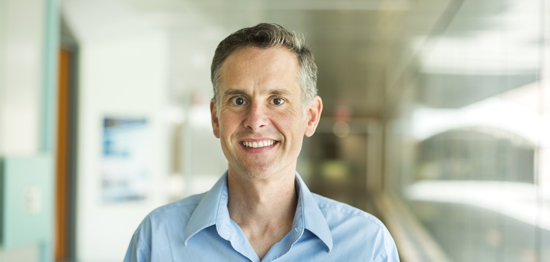Jamie Phillips named Arthur F. Thurnau Professor
Students praise the personal attention he gives them, and his obvious concern for their personal and professional development.

 Enlarge
Enlarge
Professor Jamie Phillips has been named an Arthur F. Thurnau Professor, a title granted to tenured faculty whose dedication to undergraduate instruction has demonstrably impacted the intellectual development and lives of their students.
“Prof. Phillips is one of our best teachers,” said Khalil Najafi, Schlumberger Professor of Engineering and Chair of Electrical and Computer Engineering, “and teaches some of our most challenging introductory undergraduate classes. He has introduced several new approaches to teaching and is able to describe the most complicated physics and electrical engineering concepts in a fun and interesting way. He is well known for his outstanding teaching, pedagogical research, curricular innovations, and mentoring of undergraduate students.”
Since returning to Michigan as a faculty member (he is also a Michigan alumnus) in 2002, Prof. Phillips has demonstrated a consistent and passionate devotion to undergraduate education. He has taught 22 courses of all levels, primarily to undergraduate students. Students praise the personal attention he gives them, and his obvious concern for their personal and professional development.
He transformed a first year ENG 100 course from a theoretical course emphasizing physics to a hands-on, team-based course on solar energy. For their final project, students working in teams dream up solar powered devices and then design, built and test prototypes that they pitch as hypothetical startup companies. Harris Corporation sponsored the course in Fall 2011, and in the current term, students are partnering with the Sa Nima Collaborative student group on a major design project that will help provide solar powered lighting to the village of Samox, Guatemala.
Prof. Phillips has also dramatically improved some of the core undergraduate courses taken by electrical and computer engineers. One of the ways he has enlivened the material is through active learning in the classroom. In the third year course, Intro to Semiconductor Devices, for example, he has students role-play the movement of electrons in semiconductors to help them understand the underlying physics. In the senior level course, Properties of Transistors, he introduced a computer-aided-design (CAD) component that utilizes industry-standard device software. Students who have gone on to work in industry have reported that they have greatly benefited from this addition.
Prof. Phillips invested in his own teaching expertise with support from two U-M Center for Research on Learning and Teaching (CRLT) Investigating Student Learning grants, and a Provost’s Third Century Initiative Exploring Analytics Grant. With support from these programs, he is exploring ways to improve instruction even in his current ENG 100 course, and is investigating ways to best advise students in ways that will lead to their ultimate success in the field of engineering.
In addition to his efforts in the classroom, Prof. Phillips provides invaluable support to our undergraduate students by offering them research spots in his research group. Of the 22 undergraduate research students he has advised, four have co-authored papers that have appeared in peer-reviewed journal articles. Most of these students have gone on to graduate study at the most prestigious institutions in the United States.
Prof. Phillips has served students as an undergraduate advisor, as advisor to the IEEE student branch, and as a member and past president of the EECS Alumni Society. He is currently Associate Chair of Undergraduate Affairs and Chair of the ECE Undergraduate Academics Committee in the EECS Department. He received the EECS Department Outstanding Achievement Award in 2007 and the University Undergraduate Teaching Award in 2011.
Professor Phillips is a member of the Solid-State Electronics Laboratory, and of the University of Michigan Energy Institute. His research is focused on optoelectronic materials for next generation infrared detectors, solar cells, and thin film electronics. He is exploring the unique properties of nano structured materials to improve solar energy conversion efficiency using techniques including intermediate band states and light trapping. He has received an NSF CAREER Award and a DARPA Young Faculty Award.


 MENU
MENU